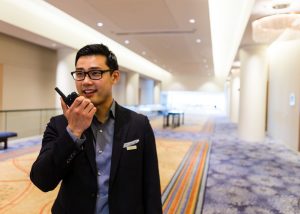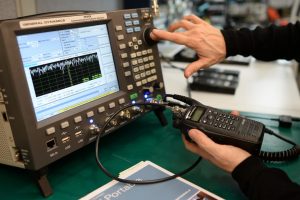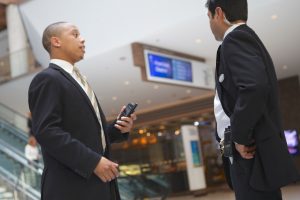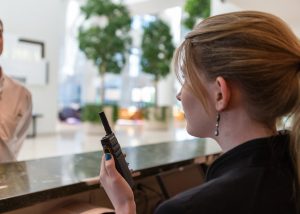Creating the ultimate guest experience is the objective of every hospitality business in Alberta. You name it: resorts in Banff or Jasper, conference halls in Edmonton and Calgary, golf courses or ski hills in Fort McMurray. They’re all in search of ways to make a visitor’s stay more memorable and an organized team that can communicate effectively is key to getting there.
Earlier in 2019, Motorola Solutions released its survey of the hospitality industry to learn how teams in this industry communicate on the job, where the challenges were, and how they could be overcome. They reached out to maintenance and engineering staff, management, IT, customer service, and security, among other departments. Here’s what they found.
A High Rate of Adoption
60% of those who responded to the survey said they were already using two-way radios, half of which had migrated from analog to digital. 40% of those still using analog two-way radios expressed to surveyors a desire to make the switch to digital within the next five years.
This trend suggests that the hospitality recognizes the benefit digital two-way radios provide. The improved range, battery life, and audio clarity that are standard in digital radios make them far more reliable tools for communication than their analog predecessors. The applications, like Work Order Ticketing and limited SMS messaging, are other features common to digital two-way radios, and they help hospitality teams communicate and collaborate efficiently, both within and across departments.
The survey also noted that 32% of respondents rely primarily on smartphones, 5% relied on landlines and another 3% used IP or Wi-Fi dependent devices.
The Challenge: Fixing Equipment as You Go
Worth noting is that nearly 60% of those who reported using digital two-way radios had no concrete plans for maintenance, choosing to service their radios as problems arose or became a serious impediment to communication. Another 10% admitted not knowing how often the radios were sent in for service.
Fixing two-way radios on an ‘as needed’ basis may seem like a safe decision, but it runs the risk of leaving gaps in your communication. It becomes difficult to predict when problems will arise, and when the regular wear and tear of everyday use will add up to a radio being in real need of repair. If, for example, a hotel manager suddenly realized she needed 10 of her 50 radios repaired the week before Christmas, the gaps in communication caused by losing these radios could result in guests being underserved during a peak season in the hospitality industry.
The Solution: Regular Maintenance to Mitigate This Risk
At Tridon, we recommend all of our clients establish a regular maintenance plan, so their radios provide peak performance when they are most needed. Replacing damaged antennas will keep transmissions clear. Firmware updates ensure your two-way radios run at peak performance. Even something as simple as regularly cleaning radios and accessories can improve audio quality and the overall user experience. And, most importantly, regular maintenance reduces the risk of a surprise malfunction in the middle of a workday or busy season. Your radios are ready to work when you are.
However, regularly scheduled maintenance might be surplus to requirements (or outside the budget) of some hospitality businesses, especially seasonal businesses like campgrounds or ski resorts. As an alternative, some hospitality businesses rent two-way radios from Tridon. The cost of maintenance is included in the rental fees, making costs easier to budget. And, as we regularly rent two-way radios to customers, we regularly service them to ensure they provide optimal performance in the field. And, should a radio need servicing during the rental period, a replacement unit can be provided so that your team always has the radios they need.
The Challenge: Juggling Multiple Devices
80% of those responding to the survey said they were using more than one device to communicate with co-workers and managers. Usually, it was a combination of two-way radios and smartphones but sometimes included IP devices and landlines. In all likelihood, that means they would use one device to contact one employee or department, and another device to contact another department.
Why This Matters
Think about what that means in practice. If, for example, a maintenance worker had to contact a manager who is only reachable by a cellular or landline call, they would have to put down the job they were working on to make that call, and maybe even relocate to a part of the facility or property with better reception. This may be a minor issue in a hotel environment, but at a resort or a ski hill, finding the right communication tool could eat up valuable time that could be spent solving a problem for your guests.
Multiple devices also mean greater complexity when it comes to maintaining the equipment. The time required to repair a smartphone covered by warranty will differ from the time required to fix problems with IP-based communications. Those times will differ from the time required to service two-way radios, and so on. All of this adds up to a range of costs and intermittent gaps in your communications due to equipment availability.
And, there’s also the wildly ranging purchase prices of all these different pieces of equipment.
The Solution: Consistency
94% of respondents said their jobs would be easier if all devices were able to communicate with each other. One of the simplest ways to ensure that is to give everyone the same equipment.
There is a range of two-way radios that are well suited to hospitality environments. If your team works indoors (e.g. hotels, casinos), there are sleek, durable radios like the Motorola SL 300 that provide reliable communication while maintaining a professional image for your staff. For hospitality teams working outdoors, the Motorola XPR 3300 would provide clear, reliable communication while also offering a rugged design with considerable waterproofing and dust-proofing as an added benefit.
Getting Started
A team that can communicate effectively is better able to create the guest experience that results in repeat visitors, and two-way radios are an ideal fit for business-oriented conversations. They allow your team to communicate instantly and, with the right accessories, discretely, allowing them to respond quickly to the needs of your guests.
If you’d like to read the full survey from Motorola, click here.
But, if you’re ready to start working on a two-way radio solution for your business, or if you just have questions, you can Contact Us. Our Service Technicians and Account Managers have years of experience supporting radio systems across Alberta. We’re here to help.
Tridon is a full solution Telecom Systems Integrator with CSA certification and licensed by APEGA. Our Engineering, Service and Tower Divisions collaborate with customers to build engineered solutions including communications systems design, tower inspections and co-location, wireless broadband, fiber optic cabling, site security, and two-way radio communication.





